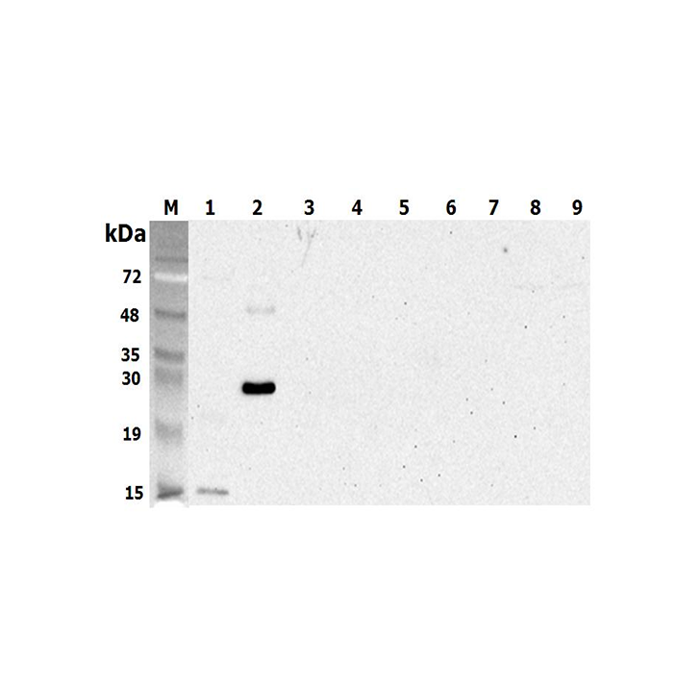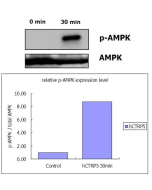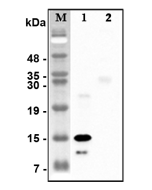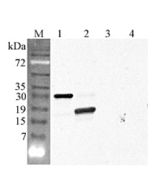Cookie Policy: This site uses cookies to improve your experience. You can find out more about our use of cookies in our Privacy Policy. By continuing to browse this site you agree to our use of cookies.
AdipoGen Life Sciences
anti-CTRP5 (human), pAb

1: Human CTRP5 (tGD) (His-tagged).
2: Human CTRP5 (His-tagged).
3: Human CTRP5 (GD) (His-tagged) (negative control).
4: Human CTRP6 (His-tagged) (negative control).
5: Human CTRP6 (GD) (His-tagged) (negative control).
6: Human CTRP7 (GD) (His-tagged) (negative control).
7: Human CTRP9 (GD) (His-tagged) (negative control).
8: Human CTRP10 (GD) (His-tagged) (negative control).
9: Mouse FTO (His-tagged) (negative control).
| Product Details | |
|---|---|
| Synonyms | Complement C1q Tumor Necrosis Factor-related Protein 5; C1QTNF5 |
| Product Type | Polyclonal Antibody |
| Properties | |
| Source/Host | Rabbit |
| Immunogen/Antigen | Recombinant human CTRP5. |
| Application |
ELISA: (direct and indirect: 1:2’000-1:5’000) Note: Tested on recombinant proteins and/or target-protein transfected cell lines in ELISA, Western Blot and/or FACS. |
| Crossreactivity | Human |
| Specificity |
Recognizes the N-terminal half of CTRP5 full-length protein. Detects bands of ~15kDa and ~26kDa by Western blot. |
| Purity Detail | Protein A-affinity purified. |
| Concentration | 1mg/ml |
| Formulation | Liquid. 0.2μm-filtered solution in PBS, pH 7.4. Contains no preservatives. |
| Isotype Negative Control | |
| Shipping and Handling | |
| Shipping | BLUE ICE |
| Short Term Storage | +4°C |
| Long Term Storage | -20°C |
| Handling Advice |
After opening, prepare aliquots and store at -20°C. Avoid freeze/thaw cycles. |
| Use/Stability | Stable for at least 6 months after receipt when stored at -20°C. |
| Documents | |
| MSDS |
 Download PDF Download PDF |
| Product Specification Sheet | |
| Datasheet |
 Download PDF Download PDF |
CTRP5 (C1qTNF-related protein 5; C1QTNF5) belongs to a highly conserved family of adiponectin paralogs. CTRP5 mediates activation of AMP-activated protein kinase (AMPK) in muscle and liver cells, thereby regulating glucose and lipid metabolism. Serum levels of CTRP5 are significantly higher in obese/diabetic animal models compared to normal controls. Furthermore, CTRP5 may be a putative biomarker for mitochondrial dysfunction. Defects in C1QTNF5 are a cause of late-onset retinal degeneration (LORD).








